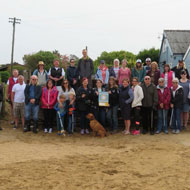
Plastic drinks caps among the most common rubbish items
Veterinary nurses took part in the first beach clean for Veterinary Nursing Awareness Month (VNAM) this year, clearing 27 bags of rubbish from Old Hunstanton Beach in Norfolk.
The beach clean, attended by over 40 people, was organised by BVNA Council member Jo Hinde and RVN Diane Westwood-Rowland.
“Veterinary nurses are often giving their very little spare time to causes that improve welfare for both humans and animals,” Jo Hinde said. “Beach cleans are a great example of this. Litter, especially plastics and fishing gear, can cause devastating and often life-threatening problems for our wildlife and eco system.
She added: “It was super to have the support of nurses and the general public on the day and help raise awareness of this problem as well as highlight some of the amazing things that veterinary nurses do.”
The most common waste items found during the beach clean were plastic caps from bottled drinks, cotton ear bud sticks and baby wipes. Other frequently found items were fishing netting, rope and monofilament lines, which can all be deadly to many animals.
Diane Westwood Rowland said: “The importance of the beach clean was highlighted when we sadly found two deceased animals, a seal and a gannet. We do not know what killed these beautiful creatures, but it reinforces the fact that humans need to wake up to the damage they are causing.”
There are plans to include the clean up in future VNAM campaigns and expand it to beaches across the UK.
Image © Jo Hinde



 The Animal and Plant Health Agency (APHA) has updated its online reporting service for dead wild birds.
The Animal and Plant Health Agency (APHA) has updated its online reporting service for dead wild birds.